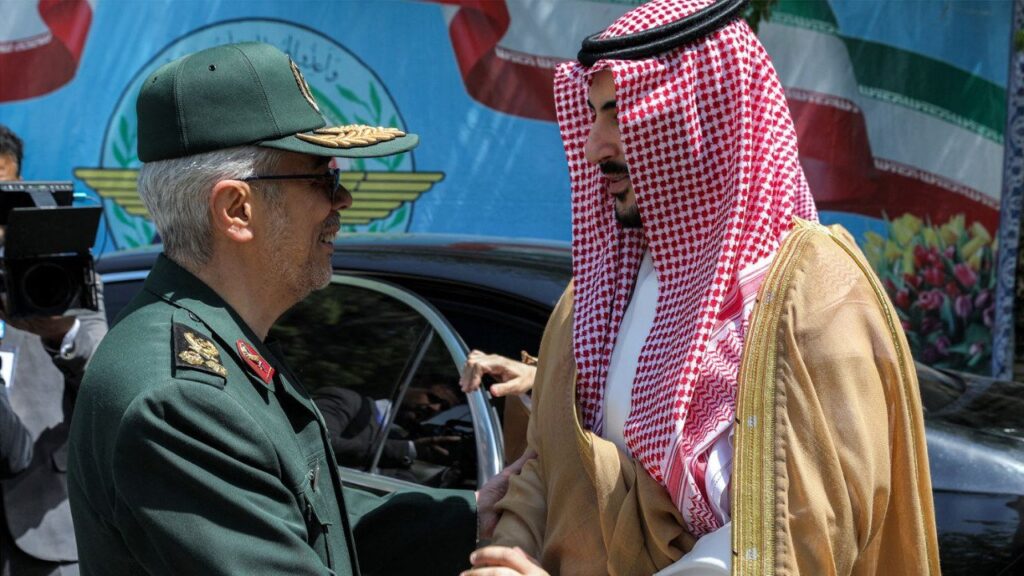MADRID – Saudi Arabia’s defense minister Khalid bin Salman landed in Tehran this week on an official visit to force further ongoing diplomatic thawing between two major powers in the Persian Gulf.
The reception, which was accused by full military honor and led by Major General Mohammad Bagheri, chief of staff of the Iranian army – tempered the mutual willingness of both capitals to institutionalize a new phase of strategic dialogue.
The visit, which was made at the invitation of General Bagheri, includes a series of high-level meetings with senior Iranian political and security officials. According to official Iranian sources, the talks focus on strengthening defence cooperation, improving regional stability and coordinating efforts against terrorism.
Restoring diplomatic relations in 2023 (since strengthened by Chinese mediation and months of quiet back-channel diplomacy) Iran and Saudi Arabia are engaged in a cautious but intentional reconciliation. Bin Salman’s trip marks the second highest level of military exchange since relations resumed after Saudi chief of staff visited Tehran last year. The timing of this latest visit highlights the urgency of a practical restructuring of the partnership amid fostering tensions across the region.
In a geopolitical environment characterized by sustained volatility from Yemen to the Levant and the established presence of external forces like the United States, Tehran-Ryadh dialogue is increasingly seen as a necessary stabilizing force. From an Iranian perspective, regional security can only be achieved through the Indigenous framework of cooperation, free from external actor intervention and shift priorities. Tehran continues to advocate for regional solutions that are fixed in sovereignty, mutual respect and rejection of foreign military entanglements.
One of the central points of the visit agenda is the conflict in Yemen. Sources close to the talks said Saudi Arabia conveyed its intention to not take part in a new ground attack on the Ansarola Resistance movement and called for Tehran’s assistance in passing this message to the Yemeni leaders. Reaffirming its support for this legitimate resistance movement, Iran has expressed his willingness to promote dialogue in unison with its long-standing position in favor of negotiated political solutions rooted in regional consensus.
But for Iranian officials, substantial advances in normalizing Saudi Arabian language depend on a fundamental change in Riyadh’s attitude. Advisors to Iran’s Foreign Ministry have repeatedly emphasized that trust can only be rebuilt if Saudi Arabia recognizes Tehran’s failure to make its military campaign in Yemen, taking steps to end the “unprecedented humanitarian catastrophe” given to Yemenis.
Additionally, Tehran has expressed concern about the possibility that Saudi Arabia’s alignment has been updated, warning that such a move is a step away from the new regional order. From an Iranian perspective, the geopolitical landscape is undergoing deep transformation defined by the erosion of traditional Western-dominated alliances and the rise of a multipolar configuration in which local actors must rely on self-determined, comprehensive diplomacy.
“Iran’s true strategic enemy is not Saudi Arabia, but the United States,” said a senior scholar and advisor, who emphasized that the core of Iran’s divergence with Riyadh lies in its approach to Yemen. The changing rhetoric that emerges from Tehran reflects broader strategic trust. That “difference in resistance” policy is based on principles, but open to practical engagement – gradually reshaping the balance of regional power.
Tehran seized the opportunity to visit to express concern over the possibility of a former US president’s visit to Saudi Arabia. Diplomatic sources say Iranian officials have adopted a moderate stance in the face of potential conflict proposals and urged Riyadh to communicate to Washington the need to prioritize dialogue and regional stability over short-term political interests. Iranian authorities hope that the current Detente process will not derail with external pressures that do not reflect the interests of local people.
For many observers in Tehran, Saudi Arabia’s diplomatic pivots are not a coincidence, but a direct result of the region’s changing geopolitical landscape. Iran’s perception is clear. Crown Prince Mohammed bin Salman appears to have agreed to the reality that sequestering Tehran is not only impractical, but ultimately harmful to Riyadh’s strategic interests.
From an Iranian perspective, this change establishes the doctrine of “positive resistance” and reinforces the belief that it is on Iran’s side to shape order in the new region, not only refusing to succumb to foreign pressures. This new phase is defined by the decline of American hegemony, the rise of Asian powers, and the progressive erosion of the traditional security alliance that has long ruled the Persian Gulf.
Tehran interprets the Saudi Arabian overture as a temporary manipulation, rather than as a strategic victory. The fact that even the monarchs, which historically lined up with the West, have their gaze eastwards, are a clear indication for Iranian officials that regional stability cannot be achieved without Tehran’s active involvement. From this perspective, Iranian diplomacy is shown to be ready to play a constructive role. It supports its central principles, but embraces the logic of multilateral cooperation that leaves no room for military adventurism, lacking exclusive policies or regional consensus.
Ultimately, the Saudi Alanian reconciliation demonstrates a huge change in geopolitical dynamics in the Persian Gulf. It emphasizes not only a practical response to the new reality, but Iran’s strategic flexibility, its willingness to integrate leadership without submission to external dictatts. As regional powers are forced to reconcile the alliance, Iran has taken on a central position in the creation of an increasingly stable and cooperative order. The future of this region may depend on whether this dialogue (which aims to transcend historical competition) can be fixed in mutual understanding and shared sovereignty, separating the territory from the effects of cross-sectional agenda distortions.

